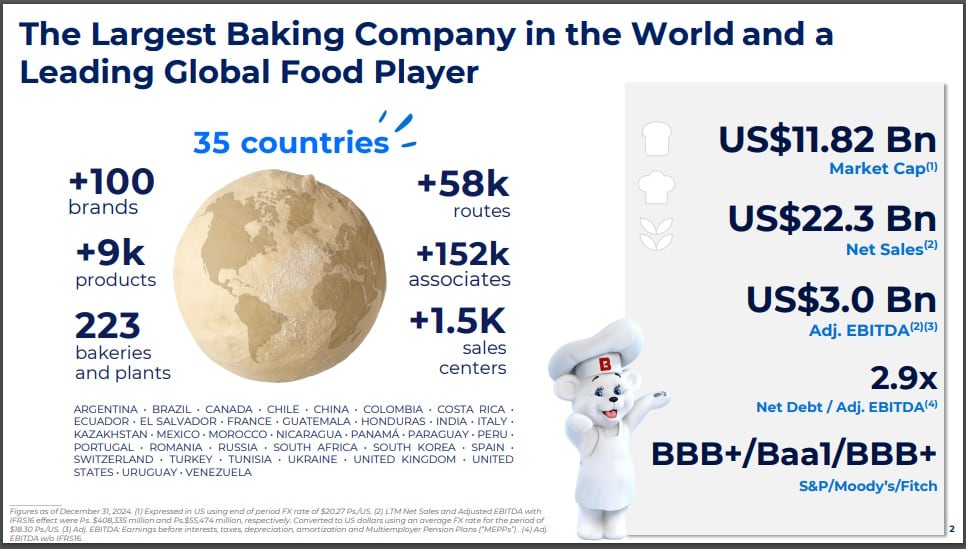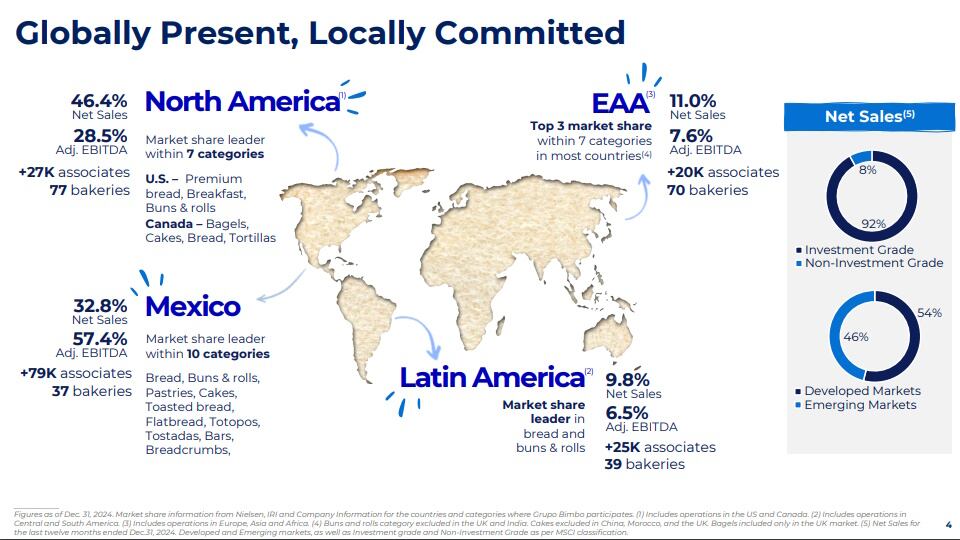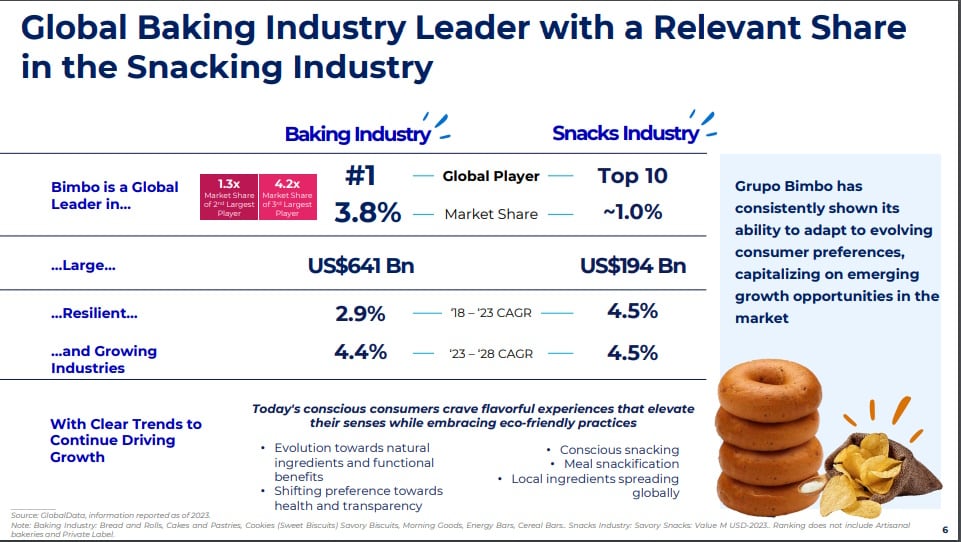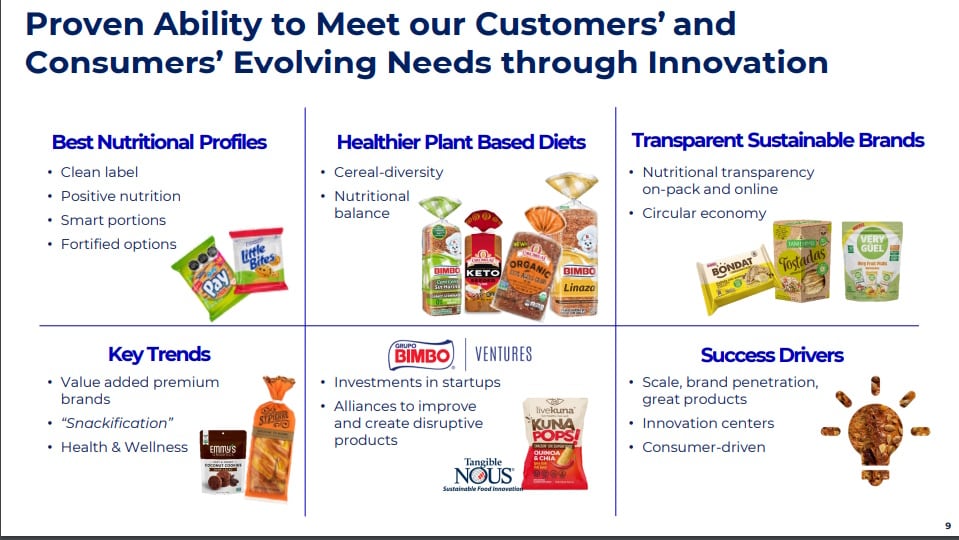Grupo Bimbo finds itself at a critical juncture, balancing the shifting dynamics of the North American market while simultaneously expanding its global footprint. Challenges such as strained US-Mexico trade relations, a weakened US consumption environment, and rising competition are forcing the company to adapt rapidly. At the same time, it’s making a bold push into China, seeing it as the next frontier for growth.

Tariff turmoil
President Donald Trump’s long-threatened tariffs against Mexico and Canada have gone into effect, putting global markets on edge and setting up costly retaliations by its allies. At midnight on 4 March, imports from Mexico and Canada are subject to a 25% tax. While Mexico has not yet outlined its countermeasures, the Canadian government has signalled it will implement retaliatory tariffs on US agricultural goods and manufactured products.
Initially scheduled for February, the tariffs were delayed for 30 days to allow further negotiations with America’s two largest trading partners. The stated reasoning behind the tariffs is to combat drug trafficking and illegal immigration, though both Canada and Mexico argue they have already made significant progress on these issues. Trump, however, has also suggested that the tariffs will remain in place until the US trade imbalance is resolved - an outcome that is unlikely to align with political timelines.
The US-Mexico trade relationship has long been central to Grupo Bimbo’s operations. Given the uncertainty surrounding trade policies, the company is taking proactive measures to maintain stability.
During the company’s Q4 2024 earnings call, CEO Rafael Pamias reassured analysts that less than 10% of Bimbo’s US revenues stem from Mexican exports, meaning direct exposure to tariffs is minimal. However, he emphasised the Mexico City-headquartered company is leaving nothing to chance.
“We have contingency plans to mitigate any impact, including maximising local production in the US,” said Pamias. Bimbo is also making strategic investments in US-based distribution, marketing and innovation to strengthen its foothold in the market and reduce dependency on cross-border trade.

The challenges of the US market
Despite its dominance in the baking sector, Bimbo has faced strong headwinds in the US. The company’s North American revenue declined by 5.7% in 2024, driven by a combination of sluggish consumer demand, inflationary pressures and a strategic exit from certain non-branded businesses, such as its private label bread supply agreements with regional retailers.
Inflation and restructuring efforts further impacted profit margins, with the company reporting a 390-basis-point contraction in its adjusted margin. Investments across the supply chain in North America also led to a contraction of operating income and adjusted EBITDA margins by 50 and 70 basis points, respectively.
“North America remains a challenging market for us,” acknowledged executive chairman Daniel Servitje. “However, we are making significant investments in our business to optimise our footprint, better serve our retailers and continue delivering high quality products.”
Bimbo has responded to these pressures with a restructuring initiative aimed at improving operational efficiency. This includes the closure of underperforming bakeries in the Midwest and Northeast regions, the expansion of digital tools to streamline operations and a focus on asset optimisation.
“The first half of 2025 will be challenging due to tough comparisons and ongoing investments,” said CFO Diego Gaxiola. “However, we expect to see improvements as the benefits from these investments begin to materialise [in the second half of 2025].”
Betting big on China
While Grupo Bimbo works to stabilise its North American operations, it is aggressively expanding into China, where it sees massive growth potential. With a market of 1.4 billion people and rising demand for baked goods, China represents a significant opportunity. The company has already invested over $70 million in its Chinese operations and is rapidly growing its presence.
Kelly Zhang, GM of Bimbo China, highlighted the company’s commitment to this market. “We made a big improvement in profitability versus a year ago. The contribution to Grupo Bimbo globally is solid,” she said.
Bimbo currently operates 10 factories in China and has been expanding into new regions, particularly in central, southern and western China. It has also entered the booming $137 billion snack category with the launch of Rusk, a crispy bread-based snack aimed at younger consumers.
It is also responding to the growing cohort of health-conscious consumers by introducing zero-sugar, high-fibre bread and whole wheat options under its Mankattan brand. Additionally, the company has boosted brand awareness through large-scale marketing campaigns, including the Bimbo Global Race event, which attracted over 200,000 participants.

North America’s shifting consumer behaviour
Economic pressures have led to a divergence in spending habits in the North American market, with two distinct segments emerging: 1) budget-conscious shoppers seeking value and 2) affluent consumers willing to pay a premium for high quality, health-conscious products.
“We are seeing a bifurcation in consumer behaviour, with economically stressed consumers opting for value offerings and more affluent consumers choosing premium products,” said Mark Bendix, executive VP for North America. “Our focus is on expanding both our value segment offerings and premium products to capture these trends.”
Bimbo is adapting by strengthening its budget-friendly and premium product lines. On the value side, the company is investing in private label partnerships and optimising production costs to offer competitive pricing. Meanwhile, on the premium end, it has been ramping up innovation in health-focused products. The acquisition of Amaritta Food in Spain, a specialist in gluten-free bread, underscores Grupo Bimbo’s commitment to this segment.

Financial highlights
Despite facing challenges in North America, Grupo Bimbo posted a strong overall performance in 2024. The company achieved record net sales of Ps. 408,335 million, reflecting a 2.1% increase driven by a favorable price/mix strategy, volume growth and currency exchange benefits. Mexico, EAA (Europe, Asia and Africa) and Latin America all delivered record Q4 net sales, with Latin America also achieving its highest-ever adjusted EBITDA margin.
On a global scale, Bimbo reported record net sales of $22.5 billion and an adjusted EBITDA of $3.1 billion. The company’s market expansion strategy paid off, particularly in Mexico and the EAA region, where strong consumer demand and strategic acquisitions fuelled growth.
The company successfully completed five strategic acquisitions during the year, expanding its geographic reach to 35 countries.
Grupo Bimbo continued its commitment to sustainability, achieving 100% renewable electricity in one additional country, bringing the total to 28 out of 35 operating countries, reaching 97% renewable electricity worldwide.
“2024 showcased our resilience, innovation and unwavering commitment to excellence, as well as the importance of being a highly diversified global company,” said Pamias. “Our topline reached record levels, delivering an increase in our volume throughout the year in a still complicated consumer environment in some of our markets. In North America, regardless a continued challenging consumer environment, we embarked on an exciting project, which we expect will gradually yield benefits in the second half of 2025.”
Added Gaxiola, “More than 50% of our business delivered outstanding results. We are investing in our largest operation to secure sustainable and profitable growth in the long run.”





